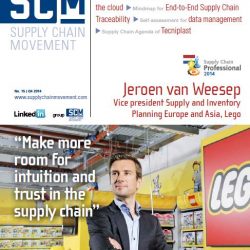Howard Saunders: ‘The customer experience depends on people’

Retail as we know it is dead, if retail futurist Howard Saunders (pictured) is to be believed. We live in an era of change, and retailers will have to change too if they are to stay relevant for consumers. He revealed the uncomfortable truth during the Manhattan Exchange on 9 October 2018.
By Marysa Vos
The retail industry is at the consumer’s mercy. The rise of e-commerce has created endless choice and made it quick and easy to select the best option. According to Saunders, the solution lies in personalization. Customers expect all products to be in stock and available for delivery at all times. In the case of an out-of-stock situation, the consumer will simply find – and buy – your product elsewhere.
AI avoids damaged reputations
At consumer level, it is increasingly common for companies to compete on service and communication. “Amazon is also raising the bar in terms of quality and standards”, said Andrew Hill, Sales Director at Sorted Group, a supplier of delivery management software. “Delivery times are decreasing, there are express deliveries all day long nowadays, and that’s creating a need for a real-time approach”, he stated.
The delivery process itself plays an ever-greater role in the consumer’s impression of the supplier. “Artificial intelligence (AI) can have the biggest impact by analysing the supply chain and predicting errors”, added Hill. The standard dataset of events that occur every day can be used to investigate whether – and if so, why – a delivery has gone wrong. “If there is a problem with a delivery, you should communicate that clearly to the customer.” By informing them that there has been a slight change of plan, you avoid disappointing – and ultimately leaving a negative impression on – the customer.
Transparent apples
Retail expert Saunders echoed that companies must become more transparent in their communication with consumers, saying that there is a need for all kinds of knowledge – from the origin of the apples on sale to where a €250 pair of jeans has been manufactured. That calls for supply chain visibility. Additionally, people are no longer impressed by brand names alone: “Consumers want an ideal product – the optimal experience combined with the best possible product, irrespective of whether it’s from a major brand or a start-up.”
Retail as we know it won’t be around for much longer, according to the futurist. “The digital era has taught us what we want to experience in the real world. While AI and robotics are making our lives easier, there’s a growing need for human contact.” Saunders’ advice for retailers is to turn their stores into ‘brand playgrounds’ that revolve around creating new experiences for consumers.
Internal change
Companies will have to make a considerable effort to keep pace with the consumer needs and demands resulting from e-commerce. During the panel discussion Barry Morgan, Solutions Specialist at Co-op (a cooperative retailer), said that it’s necessary to manage people’s internal change in order to realize external change. Meanwhile, Sophie Houtmeyers, Vice President Distribution Operations at Skechers, outlined the importance of a high-quality workforce in order to respond to the market needs: “You can have the best system in the world, the best system in your distribution centre, but it won’t work unless you have the right people.”










